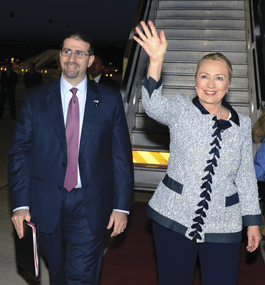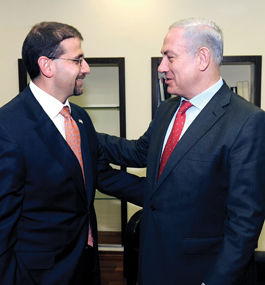The Brandeis Questionnaire
Daniel Shapiro ’91

Courtesy U.S. Department of State
Shapiro greets Hillary Clinton as she arrives in Jerusalem in 2012.
After the high-wire responsibility of serving as the U.S. ambassador to Israel, Daniel Shapiro ’91 is finally taking it easy. Sort of.
Shapiro, who has become a well-known public figure in his host country, decided to remain in Israel when his diplomatic appointment ended on Jan. 20, the day President Donald Trump took his oath of office. Shapiro and his wife, educator Julie Fisher ’90, wanted their three daughters to be able to finish out the school year. The couple has now decided to stay in Ra’anana at least a few months beyond that. They say they’re grateful for the luxury of doing some writing, spending time with their girls and catching up on sleep while they weigh their next career moves.
But it’s been a busy kind of taking it easy. Fluent in Hebrew and Arabic, active on social media, and booked solid with speaking engagements, Shapiro has joined the Institute for National Security Studies, a prominent think tank in Tel Aviv. He is a frequent source for American and Israeli journalists and scholars eager for an early take on the Trump-Netanyahu relationship and Middle East policy directions to come.
Having majored in Near Eastern and Judaic studies at Brandeis, Shapiro earned a master’s at Harvard’s Center for Middle Eastern Studies. He worked in the Capitol Hill offices of U.S. Senators Dianne Feinstein and Bill Nelson before becoming a Middle East policy adviser on the 2008 presidential campaign of Barack Obama, then the freshman senator from Illinois (Shapiro’s home state). When Obama moved into the White House, Shapiro became senior director for the Middle East and North Africa at the National Security Council. In July 2011, he was sworn in by Secretary of State Hillary Clinton as the ambassador to Israel.
Shapiro has said that, even if Clinton had won the 2016 election, it was time for him to step away from the envoy post, despite how much he enjoyed it. His six-year term was already the longest of any U.S. ambassador then in service around the world.
What was your idea of perfect happiness when you were at Brandeis?
It was always about being with friends. It could be sitting on the rocks by Massell Pond, studying together, long lunches poring over the New York Times crossword, arguing about politics or sledding down the hill outside the library. It didn’t matter. These were friends for life. By the way, I’m married to my best friend from Brandeis.
Who was your favorite Brandeis professor?
Jehuda Reinharz, PhD’72. A scholar’s scholar, whose lectures and books ignited my passions for studying Israel and Zionism.
Where did you usually spend Saturday night?
Ice cream with friends at Cholmondeley’s, or taking the train into Boston for Chinese or Indian food.
If you could be any other Brandeisian, who would it be?
Rabbi Albert Axelrad, Brandeis’ longtime Hillel director, who inspired generations of students with his wisdom, humanity and spirituality.
What is the most important value you learned at Brandeis?
Gratitude. Every day taught me how much I owed to family, friends, teachers, colleagues and even strangers.
What was the most important shortcut you learned in college?
Sleep in sweatpants so you can go directly to class without changing. (This doesn’t work so well in my recent line of work.)
Which talent did Brandeis help you develop most?
Research and analysis: How to delve deeply into a subject, master the material, then challenge assumptions and draw my own conclusions.
What do you wish you had studied harder?
Art history. I took the intro class and loved it. I felt I understood art like never before. But I couldn’t squeeze in any more courses.
What three words of advice would you give to current Brandeis students?
Study. Play. Give. (Runner-up: Eat your veggies.)
If you could go back to college, what would you do differently?
Play more basketball and read more fiction.
What would your friends say is your greatest strength?
A calm demeanor that helps me manage through crisis and turmoil.

Courtesy U.S. Department of State
Meeting with Israeli Prime Minister Benjamin Netanyahu in 2011.
page 2 of 2
What would your friends say is your greatest weakness?
Punctuality.
What is your blind spot?
I think my kids are perfect. (But, really, they are.)
What book do you read again and again?
The Torah.
What movie changed your life?
“Inside Out.” (You have to be a parent to get it.)
Which possession do you most like to look at?
A beautiful shofar we bought in Jerusalem.
Whom would you like to sing a duet with?
Beyoncé.
Which deadly sin is your middle name?
Procrastination (a form of sloth).
Which bad break was your biggest blessing?
Getting passed over to work in Barack Obama’s Senate office, but developing relationships that led me to work on his campaign, in the White House and as ambassador to Israel.
If you could climb into a time machine, whom would you like to hang out with?
Rosa Parks.
On your deathbed, what will you be most grateful for?
The love of family and friends, and the opportunities I’ve had to serve my country and help others.
